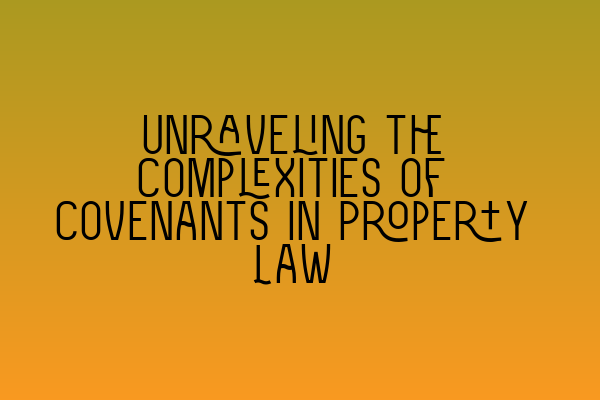Unraveling the Complexities of Covenants in Property Law
As a solicitor specializing in property law, I often come across clients who find themselves tangled in the intricate web of covenants. These legal obligations that bind parties to certain actions or restrictions can be a source of confusion and frustration for property owners. In this blog post, we will delve into the complexities of covenants in property law, providing clear explanations and insights to help you navigate this convoluted realm.
Understanding Covenants
Let’s start by defining what covenants are in the context of property law. Covenants are legally binding promises or obligations that are attached to a property. They may require the property owner to do something, refrain from doing something, or give someone else the right to do something on the property. Covenants typically arise in the form of contractual agreements, often between neighbors or through deed restrictions.
Types of Covenants
There are various types of covenants that can arise in property law. It is crucial to understand their distinctions, as they can significantly impact your property rights and obligations. Some common types of covenants include:
1. Affirmative Covenants: These covenants require the property owner to perform specific actions, such as maintaining the property, paying dues, or adhering to certain aesthetic standards. Affirmative covenants are typically designed to benefit the community or association where the property is located.
2. Negative Covenants: Conversely, negative covenants restrict the property owner from engaging in certain activities or behaviors that may adversely impact the community or neighboring properties. Examples of negative covenants may include restrictions on building a fence over a certain height, operating a noisy business, or keeping certain types of pets.
3. Restrictive Covenants: Restrictive covenants are often used in real estate development projects to regulate land use and protect the overall aesthetics and values of the community. These covenants place limitations on property owners, dictating how they can use their property and possibly prohibiting certain uses altogether.
Enforcement and Remedies
When covenants are violated, disputes can arise, and legal action may be necessary to seek resolution. The enforcement of covenants can be complex, as it often requires a thorough understanding of property law and the specific terms outlined in the covenant agreement. Remedies for covenant violations can vary depending on the circumstances, but common options may include injunctive relief, monetary damages, or specific performance.
Navigating the Complexities
Given the intricacies involved in covenants, it is crucial to seek legal guidance to ensure compliance and protect your rights as a property owner. Consulting with an experienced property law solicitor can provide invaluable insight and assistance when dealing with covenants. Additionally, obtaining a comprehensive understanding of the specific covenants attached to your property is essential before making any significant decisions or alterations.
To further your understanding and preparation for property law matters, I recommend exploring our related articles linked below:
1. SQE 1 Practice Exam Questions – Enhance your knowledge and test your understanding of property law through our SQE 1 practice exam questions.
2. SQE 1 Practice Mocks FLK1 FLK2 – Practice mocks FLK1 and FLK2 are excellent preparatory resources for the SQE 1 exam, covering various property law topics, including covenants.
3. SQE 2 Preparation Courses – Dive deeper into property law and other legal subjects with our comprehensive SQE 2 preparation courses.
4. SQE 1 Preparation Courses – Lay the foundation for your legal knowledge with our SQE 1 preparation courses, offering guidance and instruction on property law and other essential subjects.
5. SRA SQE Exam Dates – Stay informed about the latest exam dates and registration deadlines for the SRA SQE exams to ensure you are adequately prepared.
In Conclusion
Covenants in property law can be complex and challenging to navigate. By understanding the different types of covenants, their enforcement, and the available remedies, you can better protect your property interests. Remember, seeking the expertise of a solicitor who specializes in property law is essential for effectively dealing with covenant-related matters. With these insights and resources at your disposal, you can confidently tackle the complexities of covenants and ensure compliance with your property obligations.
If you have further questions or require legal assistance in handling covenants or any other property law issues, please do not hesitate to reach out to us at SQE Property Law & Land Law. We are here to provide professional guidance and support every step of the way.
Note: This blog post is provided for informational purposes only and does not constitute legal advice. Please consult with a qualified solicitor to address your specific situation and legal needs.
